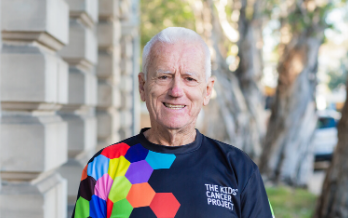Col Reynolds Fellow, Dr Karin Plummer

Recipient: Dr Karin Plummer
Institute: Griffith University
Funding: $487,096.00
Dr Karin Plummer holds a joint appointment at Griffith University and the Children’s Hospital Queensland Department of Anaesthesia and Pain. Karin is an emerging leader in paediatric pain management, focusing on reducing pain and distress during medical treatments for children with cancer and improving psychological health outcomes related to pain.
As an experienced nurse consultant in paediatric oncology pain management, Karin has made significant research contributions to clinical care. Her work has been recognised in Australian clinical practice guidelines and international conferences. She led the co-design of a national online learning package for oncology health professionals to improve pain management during medical procedures for children with cancer.
Dr Plummer’s dedication to reducing pain and suffering in children undergoing rigorous cancer treatments has seen her be nominated as Chair-elect of the Australian Pain Society's paediatric pain special interest group.
Motivation
Bone marrow transplantation offers the hope of a cure for children with cancer and other serious illnesses. Today more children are surviving this rigorous treatment, but at the same time, the intense chemotherapy used to prepare their immune systems for new stem cells leads to painful complications. It’s a highly specialised medical procedure used to treat various life-threatening diseases and conditions affecting children.
The procedure involves the transplantation of hematopoietic stem cells, which are immature cells that can develop into different types of blood cells, such as red blood cells, white blood cells, and platelets. I was a nurse consultant working in paediatric oncology pain management when I first saw just how much pain children undergoing such cancer treatment suffered. It’s distressing not only to the child but also to their families and healthcare providers. Seeing children endure cancer treatment has been both difficult and inspiring.
Every child facing cancer treatment should have the best possible chance at survival with the least possible pain. That’s why I decided to pursue research in oncology supportive care focusing on pain management for children undergoing bone marrow transplantation. This focus combines my expertise as a nurse consultant with research into an integrative approach to pain management. This approach is based on current evidence which considers the physical, emotional and psychological well-being of the child throughout their cancer treatment.
Research project: pain management
My research has established two key needs. Pain remains insufficiently treated despite the best efforts of healthcare providers, and pain is one of the most prevalent and distressing symptoms arising from bone marrow transplantation.
Due to the severity of their illness, children experience complex and persistent pain. And they face difficulty in communicating their pain relying on their parents to share decisions about pain management with healthcare providers. If a child’s parents lack the required knowledge and understanding to make informed decisions about complex pain management parents can be traumatised by decisional regret, especially as they see their child in pain.
Making a difference to kids
Pain management for children undergoing bone marrow transplantation remains a considerable challenge despite medical advancements. The DECIDE study aims to develop a decision aid so parents and healthcare providers can collaborate in creating a personalised pain management plan for the complex pain experienced by children during bone marrow transplantation.
Collaborative planning serves to enhance pain-related care for children undergoing bone marrow transplantation. By breaking down barriers to effective pain management it will ultimately promote their better recovery and overall quality of life. It is the collaborative development of an e-health pain management decision aid that is significant in the DECIDE study because it acknowledges the important role of parents in both the decision-making and provision of emotional support during childhood cancer treatment.
Revolutionary research
The DECIDE study aims to revolutionise pain management practices in childhood cancer care at a national level. Over the course of three years, the DECIDE project will accomplish two significant milestones. Firstly, the development of national guidelines for effectively managing pain during children's bone marrow transplantation through the formation of the first-ever Australian expert steering committee exclusively focused on alleviating children's pain during cancer treatment. Secondly, an innovative e-health decision aid, DECIDE, will be created, offering valuable support and guidance in pain management for both healthcare providers and families caring for a child during bone marrow transplantation .
The DECIDE aid is designed to optimise pain management by considering individual differences and incorporating evidence-based practices. DECIDE will provide a standardised approach that includes recommendations for pain assessment, as well as both pharmacological and non-pharmacological treatment options. Moreover, families’ values will be actively taken into account to ensure a comprehensive and personalised approach to pain management during children’s bone marrow transplantation.
Overall, the DECIDE study's comprehensive and collaborative approach to pain management in childhood cancer care has immense potential to significantly improve the lives of young patients undergoing bone marrow transplantation. Parents and healthcare providers alike will be empowered to make informed decisions based on evidence-based options available through the DECIDE aid, helping to reduce pain, enhancing recovery, and ultimately improving the overall treatment experience for these children and their families. This pioneering research aspires to pave the way for a more comfortable future for kids receiving cancer treatment.
Technology helps DECIDE
Healthcare providers report that it takes considerable time to educate parents and address their expectations about pain, which in turn delays the timely management of a child’s pain. Shared decision-making can be enhanced through the use of e-health interventions, such as decision aids. These aids may reduce decisional conflict, increase knowledge and satisfaction, and minimise future regret without increasing harm.
A bone marrow transplant's main goal is to replace damaged or malfunctioning blood cells with healthy stem cells and enable a child's body to regenerate a functional immune system and restore normal blood cell production. The treatment process is particularly beneficial for certain types of cancer, genetic disorders, and other severe conditions affecting the blood and immune systems.
Many kids lead lives free of serious diseases due to improvements in bone marrow transplantation. However, they are highly vulnerable to pain from the impact of intensified chemotherapy used to prepare their immune systems for the infusion of healthy new stem cells. For this reason, children and their families need aid to make informed decisions about complex pain management options with their healthcare providers.
My research project will co-design and evaluate an e-health pain management decision aid, called DECIDE, to support families of children undergoing bone marrow transplantation to make informed decisions about pain management options with their healthcare providers.
Col Reynolds Fellowship
The Col Reynolds Fellowship has granted me a remarkable opportunity to continue dedicating myself to helping children with cancer and their families find comfort on their journey toward recovery from treatment. With this invaluable support, I can now translate the significant findings from my research, which shed light on the intricate nature of pain experienced by children during bone marrow transplantation.
The urgency for further research in pain management has become evident, and thanks to this Fellowship, I have the resources and backing to transform my research into practical solutions that will greatly benefit the lives of future children and families undergoing bone marrow transplantation. It’s truly a privilege to be part of this transformative initiative.
Thank you, donors!
My aspiration is to become a trailblazing research leader in the field of supportive care for children with cancer. Thanks to the generous support from The Kids' Cancer Project, my work will focus on developing cutting-edge health technologies aimed at effectively managing and alleviating pain during children's cancer treatment. Additionally, I aim to pioneer personalised symptom management approaches to enhance the overall well-being of young patients.
The benefits of this funding extend far beyond my three-year DECIDE study, as it will foster sustainable, long-term improvements in the quality of care and pain management support for children with cancer and their families. Your generosity helps fund ground-breaking research projects that aim to develop innovative treatments, alleviate pain, and improve the overall quality of life for young cancer patients. Together, we can make a profound difference in the lives of those facing such a challenging time.
Find out more about the Col Reynolds Fellowship
With an investment of over $7.6 million, The Kids’ Cancer Project is ensuring that some of the best and brightest young researchers in Australia can further their careers and most importantly, their impact on childhood cancer research.


Read more from past recipients
From a field of outstanding candidates across Australia, The Kids’ Cancer Project has funded the next generation of childhood cancer researchers. Their science-backed research is sure to deliver breakthroughs across a range of areas relating to childhood cancer.

